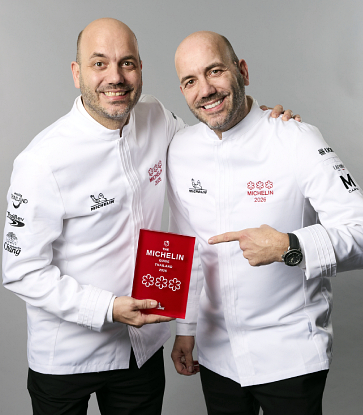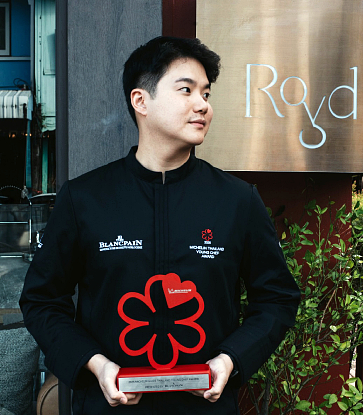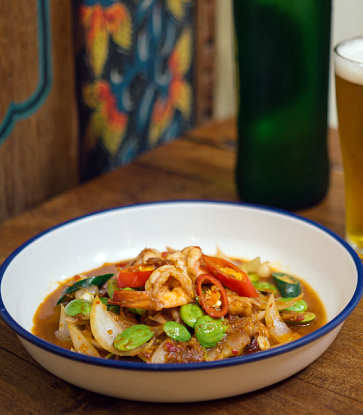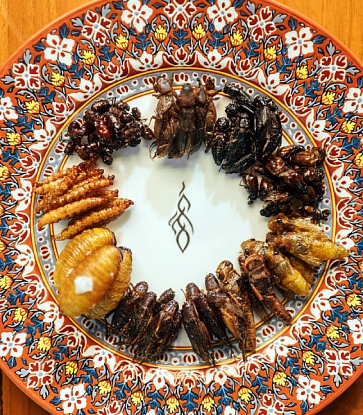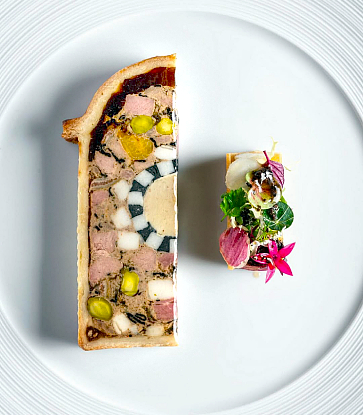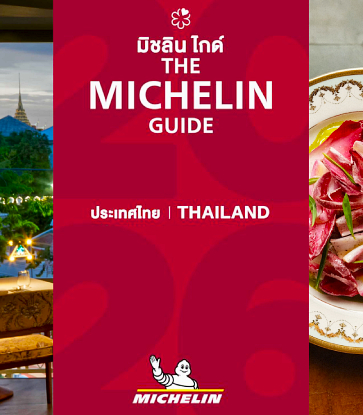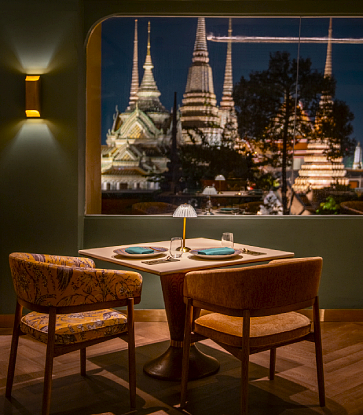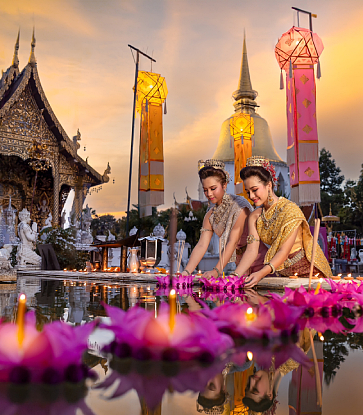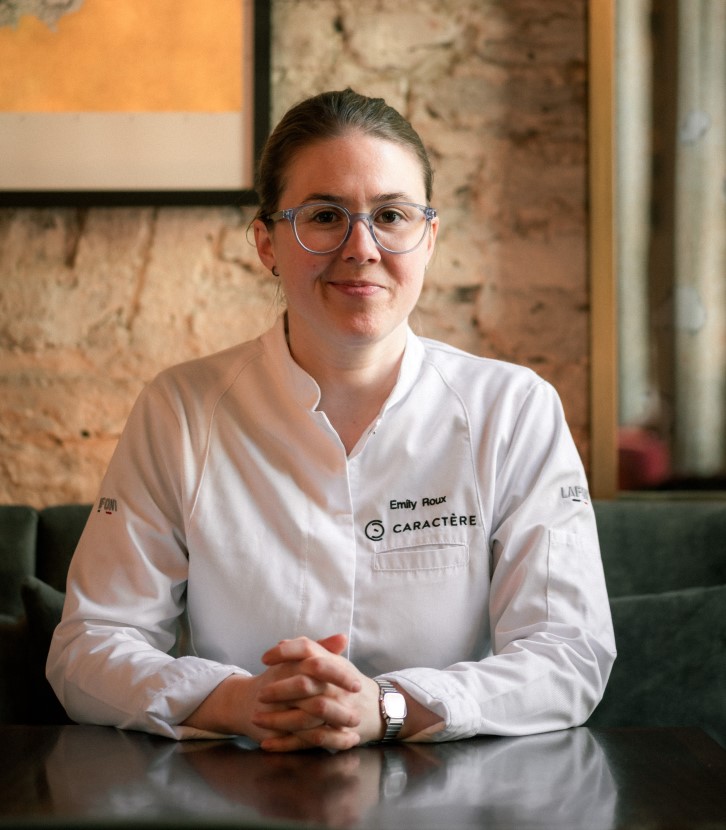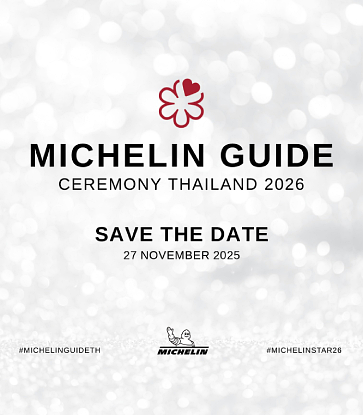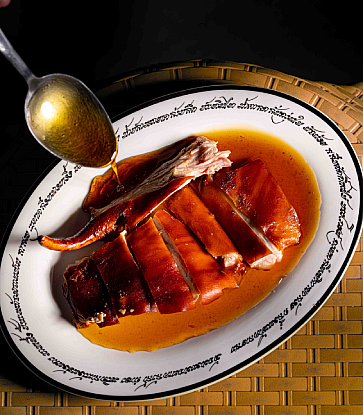In 2002, the first-ever Thai restaurant earned the prestigious MICHELIN Star. Its kitchen was run by an Australian, who would later be known as one of the finest cooks in the world of Thai cuisine.
December 2021, David Thompson was the very last to arrive at the 2022 Thailand MICHELIN Star Revelation due to an unexpected circumstance. Nevertheless, other chefs in the room offered him warm, respectful greetings once they saw who was coming in.
Top-notch commercial kitchens are where respect and acceptance are earned purely by skills — something Thompson has been gradually cultivating over his highly successful career since he started cooking Thai food at the age of 26.
Despite his many accomplishments, Thompson insisted on not focusing on the award. “If you think you are a master of something just because you receive an award for it, it is a bit dangerous,” claimed the industry veteran. Since late 2020, Thompson has been leading kitchen crews at the freshly minted one MICHELIN Starred Aksorn, a 40-seat homey eatery perched on the fifth floor of Central: The Original Store on Charoen Krung in Bangkok, serving recipes from old Thai cookbooks dated from back to the 1940s through to the 1970s.
It was no surprise to anyone in the room that Aksorn received one MICHELIN Star. We had the chance to catch Chef Thompson for a few words, fresh from the stage.
It’s another Star for you today. How do you feel?
“Old [laughs]. My knees hurt. I cook and run restaurants because I love doing it. Awards are nice, but I just don’t think much about them. If I do, then I lose focus on my cooking and the restaurant.
“I don’t chase awards. I don’t let them affect me, because if they do, you’ll get upset when you don’t get them. I just do what I do because I love it.
“I don’t think good chefs should work to get a Star. Because that means you are in this career for the wrong reason. You should be there because you love it. You should be there because you want to please people, not because you want to get awards. Some people become ruined as they chase the awards. They are hungry for more awards all the time. And that’s dangerous because then you start to lose your value and the way you understand what you do, and how you behave as well.
“I’m rather stoic about it. I think that’s the word. A philosophy word.”
“You have to understand things. But when you cook, you’ve got to forget all those things and just cook naturally.”

You once said that a good Thai cook should be the master of taste. Could you explain that?
“Absolutely. For Thai food, you have to articulate a complex array of tastes and seasonings. You have to be able to remember. You have to understand things. But when you cook, you’ve got to forget all those things and just cook naturally.
“I’ve come to the conclusion that Thai food is very different from western food. You chase the taste when you go for Thai food. And you’d use any method to get to it. While with western food, you follow the method and recipe to get to the conclusion. It’s like one is constructed from the outside, and the other one from the inside. And that very much reflects how Thais are. Thais are people who are instinctive and natural.”
At first, you said that you had no idea what Thai food tasted like. What have you learnt along the way?
“It took a while. Tasting when you cook is essential no matter what the cuisine is. If you don’t analyse, if you don’t understand it, then how do you know what you are doing? I think one thing you need is boldness. You’ve got to explore and extend until you understand, and then push until you get a finer, more honed, and more polished taste. Thai food is a contradiction. It’s a contrast of subtle and yet extreme tastes as well. You have to juggle both. You try to hold it all together to form a final finish that brings the charm that every dish seems to have. Because of the varieties and number of ingredients that you used, it’s a bloody hard task to juggle properly.
“Western food, particularly Italian food, is very simplistic. There are two or three ingredients, or sometimes four. Western food is usually kept as simple as possible, so you show off the ingredients.
“Thai food, on the other hand, is one of the most complicated cuisines in the world I think, because of the amount of ingredients you use in so many dishes, and then you have to put it all together. This makes it the exact opposite of western food. It’s not simple. Not simple at all. It’s got so many complex tastes and seasonings. That could make it a bit chaotic and enthusing to the palate. The genius of Thai food is the way it’s polished with ten or fifteen ingredients that are meant to be tasted. It’s so polished, honed, and smoothened so that it doesn’t confuse the palate. Quite profound. A truly unusual cuisine. Instinctive. It’s like the Thais themselves. Thais never follow rules. Same with the food.”
“That’s what is remarkable about Thai food: the versatility.”
You once mentioned your old teacher, Khun Yai, who could smell the curry and tell it was too salty. Could you tell us more?
“I can do that now too. But it’s not because I am clever or talented. It’s simply a matter of experience. Good cooking comes mostly from experience and practice. You can develop, hone, expand, and extend your understanding through practice.
“A very good cook has talent too. They don’t just replicate things, but they understand. And a great chef is one who can not only do all those things, but can add their own tastes and ingredients and transform it into something that’s their own. And that’s what is remarkable about Thai food: the versatility.”

Aksorn brings old-fashioned Thai recipes to life. What did you learn from studying those old cookbooks?
“I still have a lot to learn. Actually, it is still very interesting for me. Having opened Aksorn and seen the extraordinary array of recipes that are very Thai and also examples of the times they were cooked in, it is like I’ve opened up a whole new category. It was only in the 1890s that the first recipes were written down. You can see the changes from the 1890s to 1910s to 1920s to 1930s. The food changed. Every cookbook is different. There is no fixed recipe. As I said, you follow the taste.
“The recipe comes to life when it leaves the paper. It becomes tangible. And that’s why tasting is super important for every food, every cuisine, but particularly for Thai food because of its complexity. There is so much to learn from those old cookbooks. More than I’ve ever expected. I never thought that food from the 50s and 60s could contain so much integrity. So much character. I think the food from earlier times was more refined, more true, and more pure.
“Currently, we are cooking from the recipes of Khun Pao [Khun Nutchanand Osathanond – the famous food columnist, cookbook author, and presenter]. She came from an old family and was educated abroad. She had a career in the corporate world but didn’t like it. She wanted to be a cook. She has such a wonderful skill, flair, and depth of flavour. Her food is remarkable. Her green curry is a revelation. Many of her dishes are just extraordinary.
“She grew up with the food in the 1940s and 1950s, and she cooks the same style even now. She doesn’t like modern Thai food that much. She’s an old-fashioned girl who likes her own food. But there’s a reason for that. The taste is bloody delicious. It’s really interesting. And it’s good for us at Aksorn because we are able to talk to somebody who is still alive, who’s been cooking it, who can tell us, who can show us the taste and make sure that we do it well.
“I’m very grateful she’s doing this for us. It is good learning for my young chefs. Some of her techniques are obvious if you think about it, but they are unknown to me. She’s fantastic.”
“Some people become ruined as they chase the awards. They are hungry for more awards all the time. And that’s dangerous because then you start to lose your value and the way you understand what you do, and how you behave as well.”
You own quite a collection of old cookbooks from different periods. Do you observe any major differences among them, such as techniques or ingredients?
“Absolutely. It takes a while to analyse, because you’ve got to get the author’s message in a book that was written as recipes. That’s one part. The other is the availability of the ingredients, as well as the fashions and fads of cooking and eating throughout the world. It became fashionable among Thais when western ingredients were first imported. A prestigious dish used western ingredients. Some canned ingredients. You have loins of ham, salad, and stuff like that. It’s just about changing everything.
“We are about to add one dish, and it’s quite bizarre. I would never, in my wildest dreams, ever put it on or imagine I’d be cooking it now. This is a fusion piece. But if I am trying to recreate and revive recipes from those old books, I must cook like them, not following my own traverse. It’s quite interesting when you have to try to step into another person’s shoes, sensibilities, and tastes. And I was so surprised.”
There are young chefs who look up to you. What are your top three lessons that you would like to share about being a chef?
“Don’t do it! Pick some other career while you can. Do something else. Don’t do it. My parents told me exactly that, they were absolutely horrified when I said I want to work in the kitchen. Now I understand why [smiles].

“You’ve got to love it. You’ve got to love what you do because of the difficulties. The working conditions. The long working hours. The sacrifices. You need that blind love to get you through. Because if you think about the difficulties of working in the kitchen, if you are considering doing it, you’ve got to be stupid. That’s the first one.
“Second is to learn as much as you can, about the history, the science, and the flavours. All those things will help you understand what you’re doing. It’s good to have this knowledge. But then when you cook, forget about it. Don’t think. It distracts you from the nature of cooking and tasting. If you think, your taste starts to change, because you start to articulate, and it starts to interfere with the purity of taste.
“Thai cooking is instinctive and seamless. If you think, you hesitate, and then you compromise what you are doing. But when you become a master of something, all that learning goes into it, almost non-verbally. Sublimely. Because you absorbed it. It becomes part of yourself and part of your actions and so on. It’s a pattern of execution.
“Third, make mistakes. You will make mistakes, and it’s better if you do. If you do something well at the very beginning, or successfully at least, you will never understand the dynamics of cooking or the recipe, because you won’t need to investigate. You don’t need to find out what went wrong.
“I’ve made so many mistakes. It doesn’t affect me that much anymore. I see it as an advantage, if you use that problem to understand more about that dish. I saw my young chef become heartbroken when a dish went wrong. Absolutely heartbroken. I had to take him outside and say: it’s good you make a mistake. You will learn more. Mistakes should never get to customers, but they are the process of development. That’s the time you fix and refine the method and the recipes. I had to explain to him that it’s not a disaster if you make a mistake. It’s part of the process. If you don’t make mistakes, occasionally, or often, then you’re not learning.
“That mistake also reveals the character of the dish as well. It’s like a piece of handmade furniture or something handcrafted. It’s never perfect. It’s not commercial. And that’s the thing about Thai food. It has got soul.”
Hero image: © MICHELIN Guide Thailand



